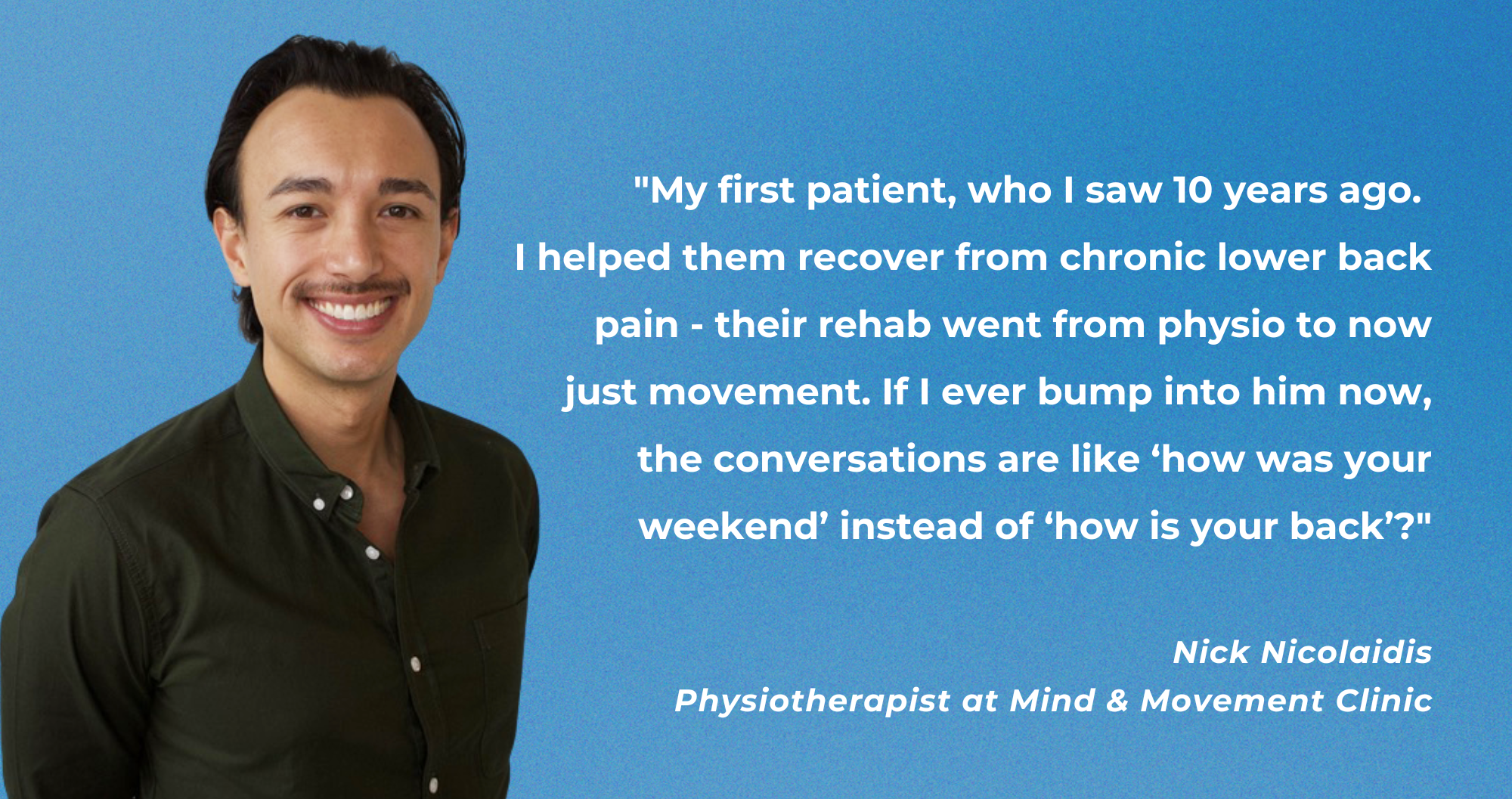Back in the game! Meet the Physio who will keep you moving
Meet Nick, our new physiotherapist with over ten years of experience. He has a thoughtful take on healing, managing pain, and how to live a healthy life. We listened to his story and the wisdom he’s picked up along the way.
What first sparked your interest in physiotherapy and how did that turn into a career? Tell us a bit about your journey.
Like any physio, I had a few injuries and played a lot of sports - soccer was the sport I played the most. I saw my local Physiotherapist, and I just loved what they did - they were able to get me back to sport, and when I had other injuries unrelated to sports, they were also a huge help. I had a lot of fun in their consultations - their general demeanour and their passion to get me better. This inspired me to become a physio - I’ve now worked as a physio for 10 years now.
You mentioned you want to specialise in the sports and exercise field. What drew you to this area?
My area's of interest are musculoskeletal injuries e.g. lower back and neck pain, as well as, sports and exercise related injuries. I really enjoy using my using my skills and knowledge to help these types of patients. I have previously run the medical team at South Melbourne soccer club. I thoroughly enjoyed that but I don't see myself working in elite sport. I more so want to apply my experiences in professional sport and my masters to the general public.
What’s the most common concern people bring to you, and what do you wish more people understood about it?
Probably chronic lower back pain – it's different from person to person, but it’s certainly the most common presenting condition. Over the years I’ve developed an approach that works well for most – a mix of genuine care, honest communication, motivational coaching and solid evidence-based treatment. What we find with chronic lower back pain is that generally speaking the prescription of exercise is essential. And the great thing about exercise is that there are multiple benefits from it - physical, mental, emotional. Movement is so good for you.
What’s one thing about pain or injury recovery you wish more people understood?
The misconception that pain doesn’t necessarily equal tissue damage. Someone’s pain is absolutely real - and when it comes to chronic pain, I’m always mindful of balancing: understanding their pain presentation and increasing their physical capacity through exercise and graded movement exposure. From there, it’s about helping them work with their condition so they can reach their goals.
How do you approach treating chronic pain differently from acute injuries?
I think the big thing is, you’ve got to treat the whole person. If it’s chronic, it’s a huge level of care. You’ve really got to take the time to understand that person's story, where they have come from, and where they want to go. You can’t put your own expectations on them - it’s person-centred. With that in mind, the treatment plan needs to be individualised and built around their goals.
The exercise prescription needs to be tailored to their lifestyle. It’s more effective to get the person working towards that goal in small and doable steps, e.g. if the patient's aim is to carry groceries without any pain, I might get them to pretend to carry groceries in their house as a first step.
I also think that working with the person's medical team is very important, working with their GP and any other allied health practitioners. At the end of the day, it’s important that we are all working together and have a coherent message. You want to be supporting each other to help the person recover.
Is there a stretch or movement you personally swear by?
Honestly… no. The reason being is I would much rather see people move in the physical guidelines rather than one particular stretch - which includes aerobic exercise and strength exercise.
Studies have shown that we have a 41% lower mortality rate if we do aerobic exercise and strength training. That’s massive. For me as a physio, the things that get me excited are not just the acute care (obviously you want to see someone's pain come down) but you also want to see a lasting impact on someone's life.
What’s been your most rewarding patient story so far?
My first patient, who I saw 10 years ago. I helped them recover from chronic lower back pain (they don’t need to see a physio anymore) - their rehab went from physio to now just exercise. If I ever bump into him in the gym now, the conversations are like ‘how was your weekend’ instead of ‘how is your back’?
What do you love about your job?
It’s funny because I say this to all the physios I mentor, but you can’t take for granted the interaction and the connection with the person - they are putting their trust in you. I just love helping people achieve their health goals. I love doing it in a way that is fun and enjoyable. That person needs to be in charge of their own care - it can’t be that I'm doing something ‘to’ them. I can give them plenty of tools and exercises, but they themselves are on their own health journey, and I’m here to support that.
If you weren’t a physio, what would you be doing instead?
I would be working remotely in the mediterranean! Either doing something in health care - or maybe running a cafe or restaurant. Anything where there is a lot of interaction with people. I love cooking - definitely not baking, but everything else! My mum is Chinese and my dad is Greek - so I have a deep knowledge of both Mediterranean and Asian food.
Nick works at Mind and Movement Clinic Monday - Saturdays. He brings vibrant energy, care and expertise to every session. Ready to feel good again? Book in your appointment today.



